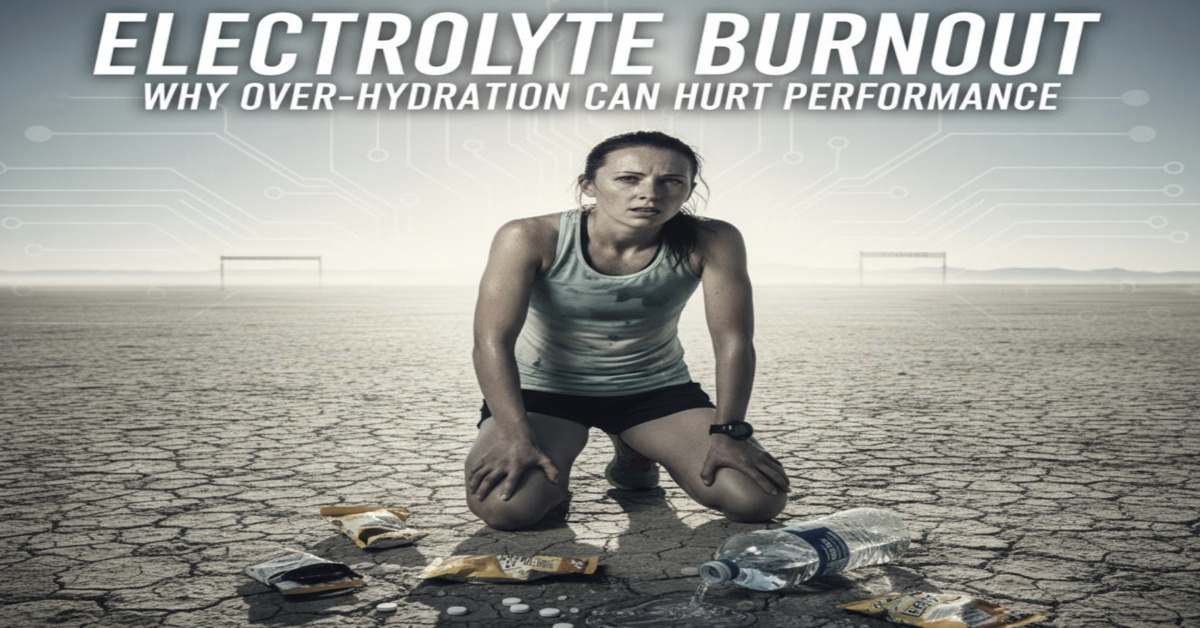Introduction: The Over-Hydration Paradox
In the pursuit of wellness, Americans have embraced hydration culture—constantly sipping water throughout the day. Yet, over-hydration can backfire. Drinking beyond your body’s needs dilutes essential electrolytes—minerals that keep your muscles, nerves, and heart functioning properly. This phenomenon, known as electrolyte burnout, can leave even fit individuals feeling fatigued, dizzy, and mentally foggy.
In 2025, remote workers, fitness enthusiasts, and athletes alike are unknowingly facing this hidden performance threat. Understanding electrolyte balance is now essential for long-term vitality and endurance.

The Science Behind Electrolytes
Electrolytes are charged minerals—mainly sodium, potassium, magnesium, calcium, and chloride—that help maintain fluid balance, transmit nerve impulses, and regulate muscle contractions. Your body constantly loses these minerals through sweat, urine, and respiration.
| Electrolyte | Primary Role | Key Sources |
|---|---|---|
| Sodium | Fluid regulation, nerve transmission | Sea salt, broth, olives |
| Potassium | Muscle contraction, heart rhythm | Bananas, potatoes, avocados |
| Magnesium | Energy metabolism, muscle relaxation | Nuts, seeds, dark chocolate |
| Calcium | Bone strength, nerve signaling | Dairy, leafy greens |
| Chloride | Maintains blood pressure & pH balance | Table salt, tomatoes |
When water intake far exceeds electrolyte replacement, hyponatremia—low blood sodium—can develop, impairing cellular communication and leading to dangerous symptoms.
What Happens When You Over-Hydrate
Excessive water dilutes sodium concentration in the blood. This imbalance disrupts osmotic pressure, causing cells to swell and reducing their efficiency.
Key physiological effects include:
- Decreased nerve transmission speed
- Muscle cramping and weakness
- Cognitive sluggishness
- Reduced endurance and coordination
According to the National Institutes of Health (NIH), mild hyponatremia can impair focus and physical performance, while severe cases can lead to confusion and even hospitalization.
Why Electrolyte Balance Drives Peak Performance
Electrolyte equilibrium ensures every muscle fiber and neuron communicates efficiently.
When sodium, potassium, and magnesium are balanced, athletes experience:
- Steady energy output
- Reduced cramps and fatigue
- Faster recovery post-workout
- Improved thermoregulation in heat
A study in the Journal of Applied Physiology found that maintaining sodium levels during endurance exercise improved performance by up to 10%, emphasizing that hydration quality matters more than quantity.
Warning Signs of Electrolyte Burnout
Modern lifestyles—especially among desk workers and gym-goers—can disguise early electrolyte burnout. Watch for these symptoms:
- Persistent fatigue despite rest
- Dizziness or “lightheaded” spells
- Muscle cramps or twitching
- Frequent urination
- Salt cravings
- Headaches after heavy water intake
Expert Insight:
“Many people assume more water equals better health, but without minerals, it’s like fueling a car with diluted gasoline,” explains Dr. Janet Lopez, Sports Nutritionist, University of Texas Health Center.
Impact on Muscle, Nerves, and Recovery
When electrolytes dip, muscle fibers misfire. Calcium and sodium imbalances interfere with contraction signals, leading to weakness and poor recovery.
Low magnesium worsens inflammation and oxidative stress, making post-workout soreness linger longer.
Over time, chronic over-hydration may even reduce the effectiveness of muscle-building workouts by disrupting cellular signaling pathways that depend on ionic balance.

Smart Hydration & Electrolyte Strategies
1. Hydrate According to Thirst, Not Habit
Let your body’s signals guide intake. Drink more only when exercising or sweating heavily.
2. Add Electrolytes to Your Routine
Use natural sources like coconut water, mineral salt, or electrolyte powders without added sugars.
3. Eat Electrolyte-Rich Meals
A balanced diet with leafy greens, avocados, legumes, and nuts helps replenish minerals efficiently.
4. Rebalance After Intense Sweat
Replace every pound of sweat lost with ~20–24 oz of fluid containing electrolytes.
5. Avoid Over-Diluting
Don’t force gallons of plain water daily; aim for 2–3 liters with proper mineral balance.
Practical Checklist for Daily Balance
✅ Listen to thirst cues instead of forcing water
✅ Include sea salt in meals if you sweat often
✅ Snack on potassium-rich foods like bananas or yogurt
✅ Use magnesium supplements if deficient
✅ Monitor urine color—pale yellow indicates proper hydration
✅ Limit caffeine if causing frequent urination
Electrolyte-Rich Foods & Beverages Table
| Food / Drink | Serving | Key Minerals | Benefit |
|---|---|---|---|
| Coconut water | 1 cup | K, Mg | Rapid rehydration |
| Bone broth | 1 cup | Na, Ca | Restores sodium & collagen |
| Avocado | 1 medium | K, Mg | Balances blood pressure |
| Spinach | 1 cup cooked | Mg, Ca | Supports recovery |
| Chia seeds | 2 tbsp | Mg, K | Hydration retention |
| Himalayan salt | ¼ tsp | Na, Cl | Mineral trace support |

Expert Insights on Hydration & Performance
“Performance isn’t about drinking endlessly; it’s about maintaining your body’s electrical balance,” says Dr. Ryan Clarke, PhD, Exercise Physiology Expert.
“Athletes who learn to replace sodium and potassium strategically recover faster and train harder,” adds Jessica Tran, RD, Sports Dietitian at Mayo Clinic.
Common Myths & FAQ
Q1. Does drinking too much water really cause harm?
Yes. Excessive water without minerals can dilute sodium and trigger hyponatremia.
Q2. Should I avoid water during workouts?
No—but include electrolyte-infused drinks or salty snacks for long or sweaty sessions.
Q3. Can I get enough electrolytes from food alone?
Generally yes, but athletes and outdoor workers may benefit from targeted supplements.
Q4. Is thirst a reliable indicator?
Usually—modern science supports the body’s innate thirst mechanism for hydration balance.
Authoritative Resources
- National Institutes of Health – Electrolytes and Hydration
- American College of Sports Medicine – Fluid Replacement Guidelines
- Mayo Clinic – Hyponatremia Overview
Internal Links
- Modern Sedentary Syndrome: The New Metabolic Threat in Remote Workers
- Rucking & Weighted Walks: The Forgotten Cardio for Strength and Longevity
Conclusion & Call-to-Action
Hydration is vital—but balance is everything. Electrolyte burnout is an overlooked problem that can drain energy, performance, and recovery potential. Focus on quality hydration through mineral-rich foods, electrolytes, and mindful water intake.
Next Step: Reevaluate your hydration habits this week. Replace plain water overload with balanced electrolyte sources—and experience sharper energy, better workouts, and sustained vitality.

